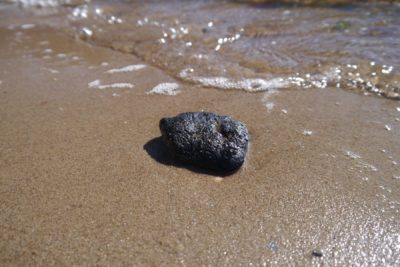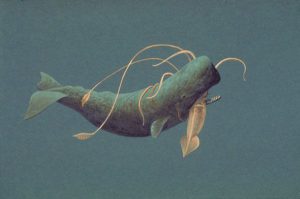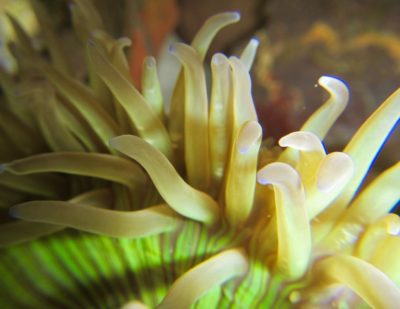
Today, we are going to learn all about whale vomit called ambergris and why a massive glob of waxy whale waste has been a hot commodity all over the world for hundreds of years! Ambergris has many common names such as “The Black Pearl, Floating Gold, or The Treasure of the Sea” this is because it’s a highly desired natural marine resource due to its chemical makeup that holds on to scents. However valuable ambergris is, it just may be one of the strangest natural resources because of where it comes from!
Sperm whales are the major producers of large ambergris balls; this is because the sperm whale diet mainly consists of cephalopods such as squid and cuttlefish. These cephalopods are member of the Mollusca phylum, which are distinguished by having a soft body, however a few hard parts such as the beak and pen can be found within the squid and cuttlefish. These hard parts are made up of a protein called chitin. The hard parts made up of a chitin protein that is indigestible by the sperm whales. It is believed the hard parts are passed to the digestive track where they bind together forming a large mass. It is unclear if the sperm whale strictly regurgitates or passes the ambergris through its rectum; nevertheless the odor of fresh ambergris is described as a strong fecal smell! After an extended period of time exposed to air and through the process of oxidation the fecal smell of the ambergris fades and becomes more of a musky earthy scent. This is where the irony of the ambergris story unfolds. The masses of floating gold have been used for century’s because of its ability to harness and hold onto scents longer. The way ambergris is utilized is by extracting an odorless alcohol called ambrein that is then used to make perfumes of high quality because of its capability to hold onto scents longer.
You may be asking yourself does this natural resource put the sperm whales at risk for predation by humans? The answer is not any more! Whales, dolphins and porpoises are protected internationally making it illegal to collect ambergris directly from the organism. However there is a grey area for collecting ambergris that has washed up into the beaches or floating at sea because according to Convention on International Trade in Endangered Species (CITES) it is a natural waste product from sperm whales making it legal to collect. The good news is science has come a long way so we can still smile and smell fresh. Researches at the University of British Columbia have been able to recreate the ambrein alcohol synthetically in a lab. Technology like this helps protect the marine animals we care for.

Sperm whale feeding on a giant squid.

Ambergris ball washed onto shore.
Sources:
https://www.nhm.ac.uk/discover/what-is-ambergris.html


